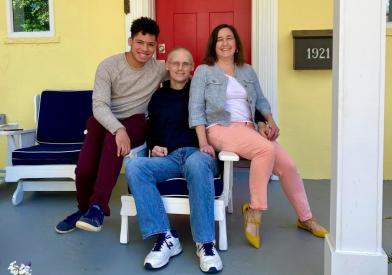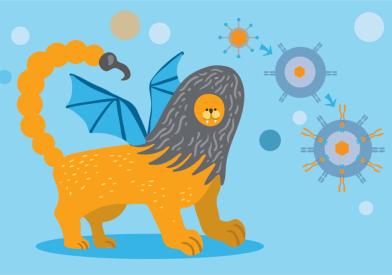What Is Acute Lymphoblastic Leukemia?
Acute lymphoblastic leukemia (ALL) is a blood cancer in which the bone marrow produces too many immature lymphocytes (a type of white blood cell), called lymphoblasts. This kind of cancer is called "acute" because it is usually a fast-growing kind of leukemia. ALL is caused by genetic changes in the cancer cells. These can be structural changes in chromosomes or in specific genes. It is not clear what causes these abnormalities to happen in any specific person. Most cases of ALL are not inherited.
Incidence
Acute lymphoblastic leukemia is a very rare disease that can develop at any age. Approximately half of cases are diagnosed in children younger than 20 years old. The other half of cases are diagnosed in adults. Only about 2,500 new cases are diagnosed in adults each year in the United States. Clinicians at Dana-Farber Brigham Cancer Center have expertise caring for patients with this rare leukemia.
Symptoms and Signs
The most common symptoms include:
- Fever
- Unexplained weight loss or appetite loss
- Weakness or fatigue
- Pain or fullness below the ribs
- Shortness of breath
- Easy bruising
- Night sweats
- Enlarged lymph nodes
These symptoms and signs can have many causes and may not be due to cancer. However, it is important that you discuss these symptoms with your primary care doctor.
Growth and Spread
ALL is often an aggressive cancer. It can involve lymph nodes, spleen, bone marrow and blood, skin, or the central nervous system.
Factors Affecting Prognosis
As with any cancer, prognosis (chance of recovery) and long-term survival can vary greatly. The prognosis can depend on age, genetic subtype, and response to therapy. ALL is a complicated diagnosis and our clinicians are familiar with the latest data; this allows our team to provide tailored treatment recommendations, recommend appropriate clinical trials, and determine the need for stem cell transplant consultation.
Age
Historically, outcomes for older children and adults were poorer than young children.
Young Adults: Our researchers have helped improve survival of adolescents and young adults (AYAs) by showing that AYAs do better when treated on pediatric protocols. (DeAngelo, Leukemia 2015)
- We have extensive expertise treating young adults with pediatric style ALL regimens.
- We have several open clinical trials for young adults diagnosed with ALL, including protocol 21-272, which is studying a new form of asparaginase in younger adults.
Older Adults: Our team is helping improve outcomes in older adults through clinical trials of new therapies.
- We have open clinical trials for older adults diagnosed with ALL (16-648).
- A geriatrician is part of the team dedicated to care for older adults with ALL.
Genetic Subtype
A common abnormality in adult ALL is the Philadelphia chromosome. Survival has improved for patients with this disease subtype if treated with targeted therapy. A current clinical trial for adults with Philadelphia chromosome-positive ALL (18-170) is evaluating a new targeted therapy (TKI inhibitor) for this form of ALL.
Response to Therapy
It is important that response to therapy be carefully monitored through specialized tests at our center so we can plan further treatment as needed. We have clinical trials of novel therapies (protocol 21-196) and CAR-T cells (protocols 18-608 and 20-562) for patients with disease that has not responded to or come back after initial therapy.
We believe access to clinicians familiar with the latest literature and available clinical trials in ALL will give you the best chance at successful treatment.




